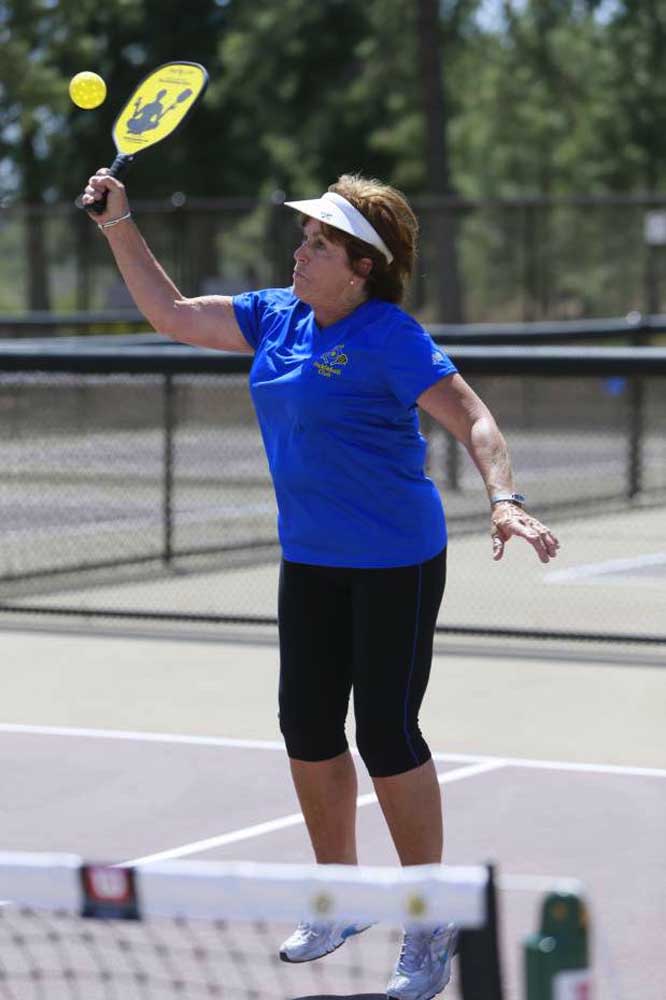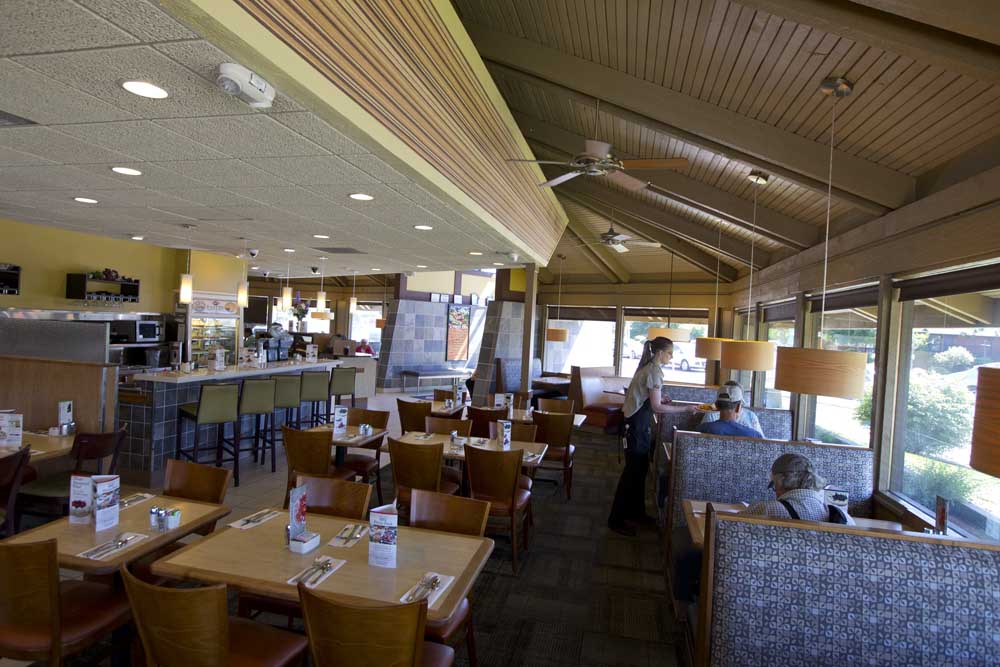Senior athletes to converge on Bend
Published 12:00 am Saturday, June 7, 2014

- Joe Kline file photo / The Bulletin Sali Hurst returns a shot while playing at Pine Nursery Park's brand new pickleball courts. These courts will host a three-day tournament as part of the Oregon Senior Games.
Barth Kleinschmidt has suffered from a hernia, prostate cancer and a stroke in the past 10 years.
He’s had both knees replaced in the past year, was left with 20-15 vision in his left eye after an operation and suffers from a clotting disorder that once caused him to lose seven of the 12 pints of blood that were pumping through his veins.
But no matter how long this list of health problems gets, Kleinschmidt can say at least one thing about his 79-year-old body that keeps him going day to day: “My arm still works.”
And that means Kleinschmidt, a former track and field star at the University of Missouri, can still throw a javelin.
“Regardless of what happens, you’ve got to be positive,” Kleinschmidt said as he practiced his javelin throw so he could compete in the Oregon Senior Games when they come to Bend later this month (see “If you go”).
More than 350 athletes 50 and older will compete in the games June 18 to 22. The competition will feature dozens of sporting events and give the state’s oldest athletes a chance to compete in the National Senior Games — an opportunity that has eluded them for more than a decade — when it takes place in Minneapolis next summer.
“You don’t lose your competitive desire just because you get older,” said A.J. Fraites, president of the Bend Pickleball Club, which plans to host a three-day tournament as part of the games. “You don’t just stop, … You try your best and you continue to improve your skills.”
The athlete
Kleinschmidt was a sophomore when he picked up his first javelin and threw it for the University of Missouri’s track and field team. It was 1955 and his college competed against the University of Kansas, Iowa State, the University of Nebraska and other track and field powerhouses that made up the Missouri Valley’s Big Eight Conference.
“It seemed like I had a natural ability to throw this damn thing,” said Kleinschmidt, who had never really thrown anything before he got to college, outside of baseballs, softballs, snowballs and the occasional mudball.
Though the University of Missouri never won a conference championship during Kleinschmidt’s time as a student, it often sent athletes to the Kansas Relays, a massive track and field competition hosted by the University of Kansas that has hosted several Olympic athletes and an attempt to break the four-minute mile during its 87-year run.
Kleinschmidt looks fondly back on this part of his life and will tell you about how he saw Al Oerter — a discus thrower with the University of Kansas who won a gold medal in the 1956, 1960, 1964, and 1968 Olympics — launch a toss over the stadium’s fence five or six times.
“All that I can say is that I’ve been lucky,” said Kleinschmidt, who after all of his health problems is grateful he can still throw the javelin and maintain a connection to this part of his life.
But these days weren’t the end of Kleinschmidt’s athletic career. That’s because he got a chance to take the field with Olympians one more time in 1987 when he joined 2,500 athletes at the first National Senior Olympic Games in St. Louis.
This biennial event, which changed its name to the National Senior Games after a 1990 dispute with the U.S. Olympic Committee, has since grown to an event that now attracts more than 10,000 older athletes.
According to National Senior Games Association’s website, the 2013 senior games brought 10,881 older athletes to Cleveland and the 2015 senior games is expected to bring another 12,000 senior athletes to Minneapolis next summer.
But before any of these athletes could reach the top stage of their competition, they had to qualify for the National Senior Games by performing well at one of the NSGA’s state senior game competitions.
This is something Oregon’s older athletes haven’t had a chance to do since the Oregon Amateur Sports Association decided it would no longer offer the Oregon Senior Games — which it ran as part of the State Games of Oregon — in the early 2000s because they weren’t bringing in enough money to make it worthwhile.
One Central Oregon tourism group decided to fix this situation when it recognized the athleticism present among some of its oldest residents and their willingness to compete on what could be a national stage.
“We thought this would be a great opportunity for Bend,” said Kevney Dugan, the director of sales and sports development for Visit Bend. “There’s a very active and athletic senior community here.”
The games
Dugan said Visit Bend started talking to the NSGA about its plans to bring back the Oregon Senior Games about five years ago because it is the perfect opportunity to attract a population that has “disposable incomes, (is) willing to travel and tends to be pretty competitive.”
He said 360 athletes from 12 states, including Florida, Kentucky, Pennsylvania, Texas, South Dakota and Virginia, had registered for the competition as of Wednesday. But he expects that number will grow to more than 500 over the coming weeks.
Dugan said the games will feature 16 sporting events, each of which has its own series of smaller events, like the track and field competition. Most athletes will compete in more than one event.
“Some people are signing up to do golf on Thursday (June 19), pickleball on Friday and Saturday (June 20-21), and the 5K run on Sunday (June 22),” he said, explaining the only limiting factor is timing — many of these events overlap.
Fraites said the pickleball tournament is going to be the senior games’ biggest event because 180 athletes will take part in the men’s singles and doubles, women’s singles and doubles and mixed doubles competitions.
He said the top three individuals or teams from each of these events will get a chance to go to the 2015 National Senior Games, where they would compete with pickleball players from across the country.
“All of the people in all of these sports would love to go to nationals,” he said, adding that this idea of having a level playing field — where a person’s age and the abilities or lack of abilities that comes with it does not matter — is probably the most attractive part of the senior games competition. “I know I would.”
Kleinschmidt also has his sights set on making it to the national games and knows he’ll need to throw the javelin at least 88 feet, 5½ inches to get a spot in his division. But his goal is to throw it for another 12 yards beyond that line, because that’s where the record stands, and records were meant to be broken,
“For my personal ego,” he said. “I want to break that damn record.”
— Reporter: 541-617-7816, mmclean@bendbulletin.com






